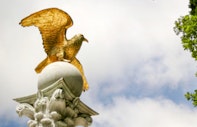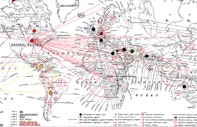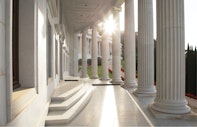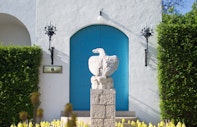What Bahá’ís Believe
Bahá’u’lláh and His Covenant
Shoghi Effendi — The Guardian of the Bahá’í Faith
Shoghi Effendi’s Passing
- What Bahá’ís Believe
- Overview
- Bahá’u’lláh and His Covenant
- The Life of the Spirit
- God and His Creation
- Essential Relationships
- Universal Peace
- What Bahá’ís Do
On 4 November 1957, Shoghi Effendi passed away suddenly in London, following a bout of influenza. He was just 60 years old. Five days later, his funeral cortege made its way northwards across the city to what was then called the Great Northern London Cemetery, where the Guardian’s remains were interred.
The following year, a simple column was built over Shoghi Effendi’s grave, fashioned from the same white marble he had himself chosen for the resting places of his illustrious family members in Haifa. The column is surmounted by a globe, the outline of Africa facing forward to symbolize the great love that Shoghi Effendi had for the continent and the spirituality of its peoples. Atop the globe sits a large gilded bronze eagle, a reproduction of a Japanese sculpture which Shoghi Effendi had placed in his own room and admired for its realism and beauty.
The Guardian’s resting place, today part of the New Southgate Cemetery, is a place of prayer and reflection for visitors from all over the world.
The Bahá’í Community 1957-1963
Despite the overwhelming grief caused by the unexpected passing of the Guardian of their Faith—and the fact that the supreme, international governing body ordained by Bahá’u’lláh was yet to be elected—the Bahá’ís of the world succeeded in maintaining their unity and single focus in a remarkable manner.
For five-and-a-half years—from Shoghi Effendi’s passing until the Universal House of Justice was able to take the reins of the Bahá’í Faith in 1963—the community’s one safe course was to follow with undeviating firmness the Guardian’s plan for the expansion and consolidation of the Bahá’í community. In this they were guided and encouraged by a body of experienced and devoted believers that Shoghi Effendi had himself raised up.
During His own lifetime, Bahá’u’lláh had appointed a few distinguished Bahá’ís as “Hands of the Cause of God”. Their role was formally defined by ‘Abdu’l-Bahá in His Will and Testament, where He emphasized and clarified their responsibilities, including protecting and propagating the Faith. ‘Abdu’l-Bahá wrote that the Guardian must appoint and direct future Hands of the Cause.
During the last six years of his life, Shoghi Effendi named 32 Bahá’ís as Hands of the Cause. When he passed away, 27 of them were still living. In a message penned just weeks before his passing, Shoghi Effendi referred to the Hands of the Cause of God as “the Chief Stewards of Bahá’u’lláh’s embryonic World Commonwealth”.Shoghi Effendi, Messages to the Bahá’í World, p. 127
After Shoghi Effendi’s death, these “Chief Stewards” determined that they would have to exercise leadership of the Faith and move the Bahá’í world as swiftly as possible towards the election of the Universal House of Justice. This was welcomed with the complete agreement and loyalty of the National Spiritual Assemblies and the Bahá’ís around the world. Shortly after assuming temporary responsibility for the Faith, the Hands of the Cause announced that the election of the Universal House of Justice would take place in April 1963.
The Hands of the Cause assisted the Bahá’í community to achieve the objectives of a decade-long plan that the Guardian had initiated in 1953. Under their leadership, the number of National Spiritual Assemblies more than doubled from 26 when Shoghi Effendi passed away, to the 56 that elected the Universal House of Justice for the first time.
In strictly adhering to the explicit criteria established by ‘Abdu’l-Bahá in His Will and Testament for the appointment of future Guardians, Shoghi Effendi did not name a successor by the time of his passing. He did not have any children; nor was there any other living male descendent of Bahá’u’lláh who displayed the necessary spiritual qualities or had remained loyal to the Faith. After the Guardian’s passing, all of the Hands of the Cause of God signed documents affirming that they could find no written Will in which Shoghi Effendi might have appointed a successor.
Since the Guardian’s passing, there have been a few attempts to create a schism in the Bahá’í community, but such is the strength and unity of the Bahá’í community that these efforts are always futile. When in 1960, at the age of over 80, one of the oldest Hands of the Cause of God—Charles Mason Remey—asserted that he was “the hereditary successor” of Shoghi Effendi, his unfounded claim aroused little interest. He died in 1974, ignored even by the handful of people who he had originally attracted.
Only the Universal House of Justice had the authority to confirm whether or not there could be another Guardian of the Bahá’í Faith, subject to the criteria for his appointment laid out in the Will and Testament of ‘Abdu’l-Bahá. Following its election in 1963, the Universal House of Justice announced that it could find no way to appoint or to legislate to make it possible to appoint a second Guardian to succeed Shoghi Effendi.
Thanks to the Hands of the Cause of God, the Bahá’í Faith remained united and protected during the critical years following the passing of Shoghi Effendi. The Universal House of Justice wrote about these Chief Stewards of the Faith, “The entire history of religion shows no comparable record of such strict self-discipline, such absolute loyalty and such complete self-abnegation by the leaders of a religion finding themselves suddenly deprived of their divinely inspired guide.”The Universal House of Justice, To the National Spiritual Assembly of the Bahá’ís of the Netherlands, 9 March 1965







